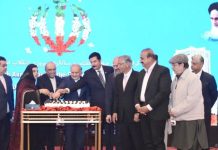MANDI BAHAUDDIN, OCT 8 /DNA/ – PODA, in collaboration with the District Health and Population Department, organized a workshop on Sexual and Reproductive Health and Rights (SRHR) and climate resilience in observance of the anniversary of the 8th October earthquake. The workshop aimed to strengthen understanding among Basic Health Unit (BHU) staff on how climate challenges affect community health and gender equality.
The activity is part of the project Reduce Early Marriages to Enhance Gender Equality, supported by the Norwegian Embassy in Islamabad. The participants of the workshop unanimously committed their support for the legal amendment to the Child Marriage Restraint Act 2015 (Punjab) to raise the minimum age of marriage for girls to 18 years. Dr. Iftikhar Ahmed, District Health Officer, District Health and Population Department, highlighted the need to strengthen collaborative efforts and existing partnerships so that all stakeholders develop a shared understanding to combat the menace of child marriages. He emphasized that girls must be encouraged to continue their education, as education is the key to empowering them for a strong and effective role in the future and to meeting the challenges of a changing world.
The workshop was conducted by Project Manager Nabeela Aslam. President of Custodian Welfare Society, Dr. Nagina Sadaf, and Dr. Zafar Hussain Zaidi, Principal of Khursheed Memorial Homeo Medical College jointly facilitated the workshop and hosted key government functionaries of the Health Department.
The discussions focused on the global and national perspectives of SRHR and the urgent need to link reproductive health with climate adaptation. The participants reflected on how natural disasters like earthquakes, floods, and droughts deepen gender inequalities and disrupt access to essential health services—particularly affecting women and girls in rural areas. The participants also suggested including reproductive health, climate adaptation, and climate resilience–related subjects in the school syllabus to build awareness and preparedness among the younger generation.
The experts noted that climate change increases risks such as early marriages, maternal health complications, and gender-based violence. In Pakistan, these impacts are even more pronounced in climate-vulnerable regions, where women face multiple barriers to healthcare, mobility, and participation in decision-making.
The health experts emphasized that ensuring SRHR is central to building climate resilience, as women’s health, education, and leadership are vital for sustainable community development.

















